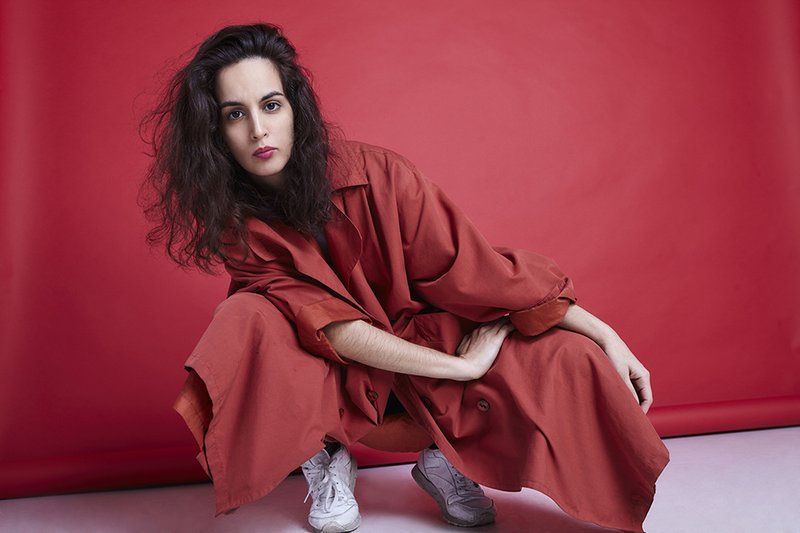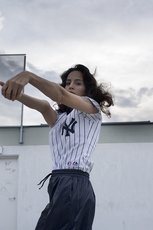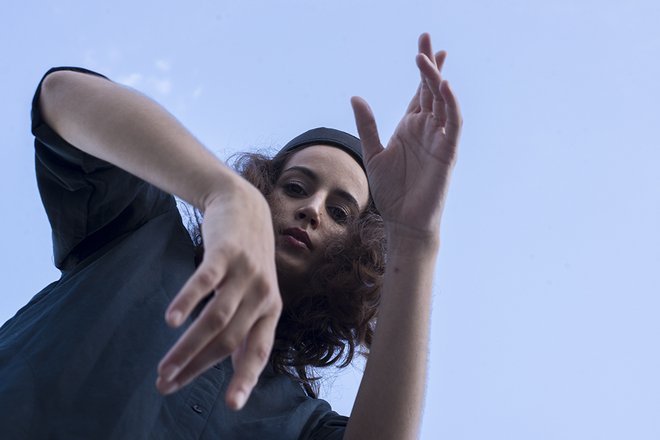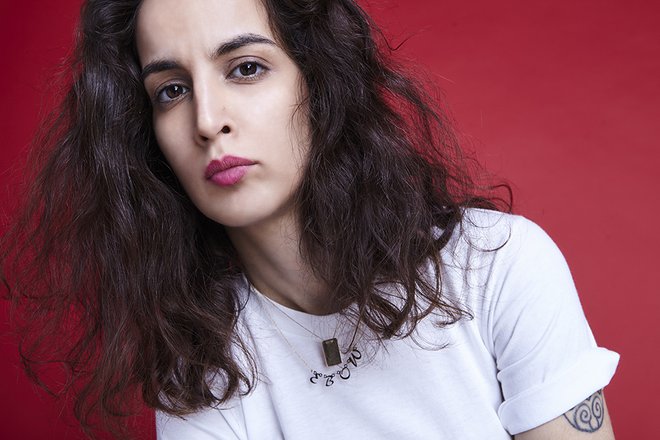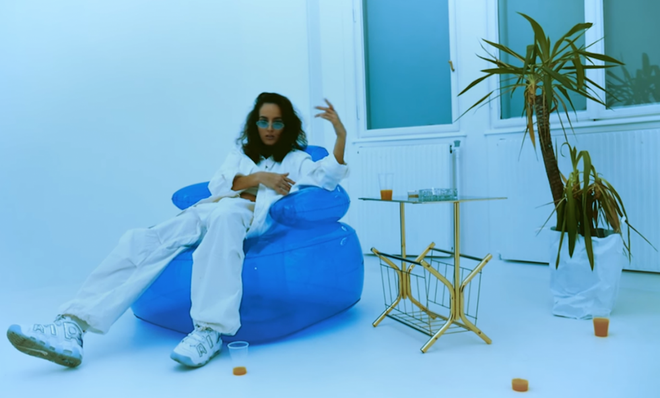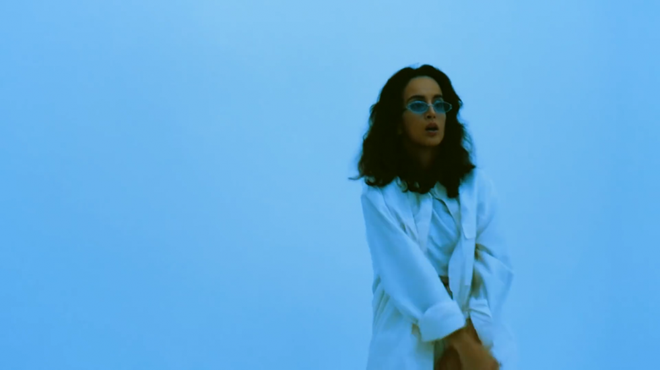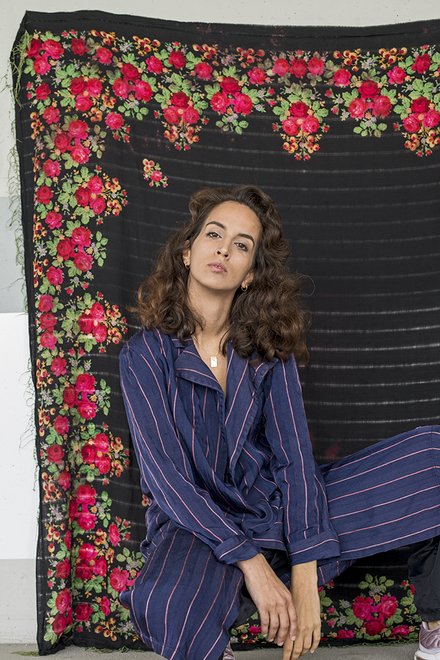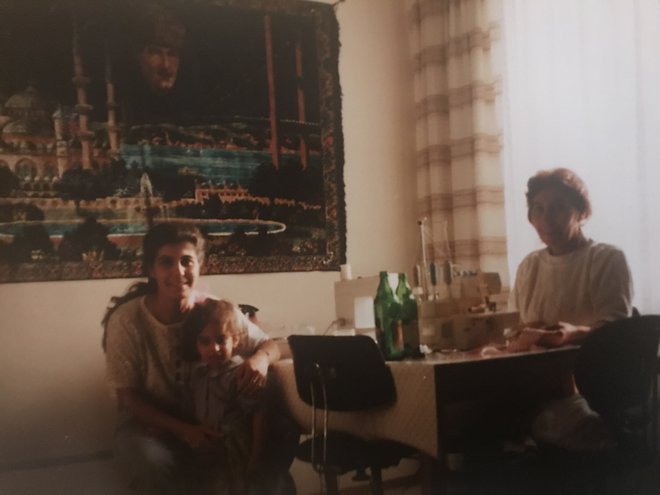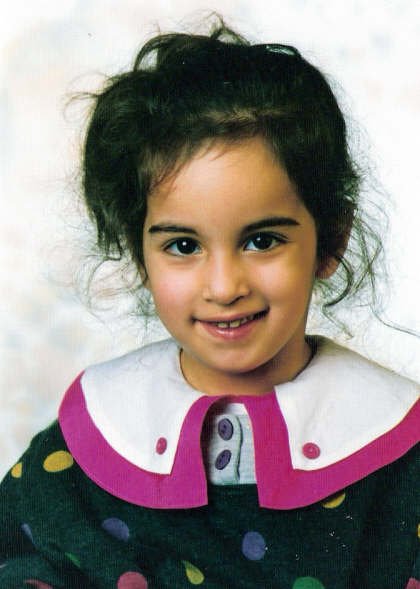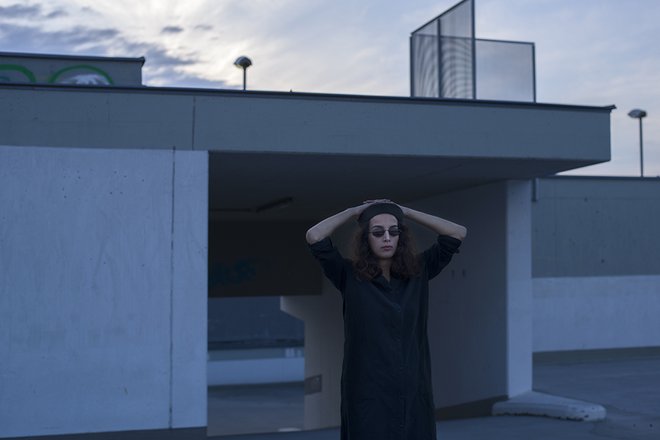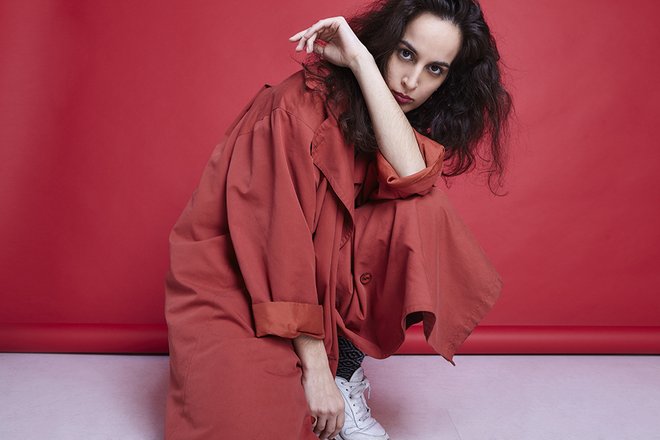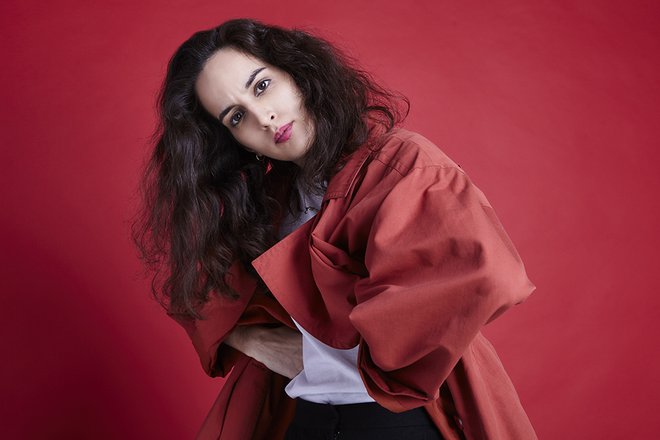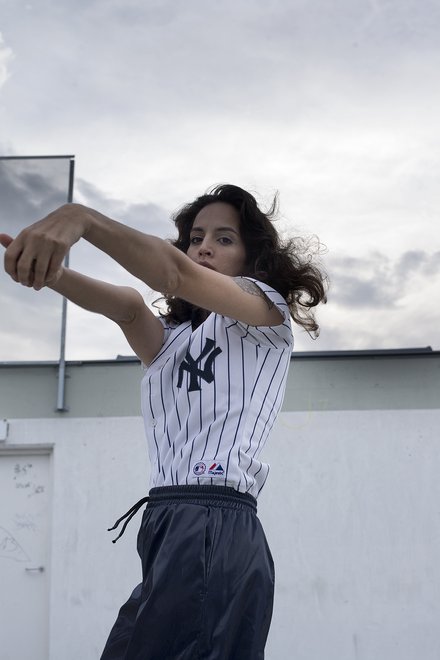complex rimes, fresh messages
The era of the fuckboys is over, my condolences. Ebow is back, bitch. And how. The Austrian musician Ebru Düzgün aka Ebow is currently conquering the hearts of her audience and the FM4 music charts with her album “Komplexität” [Complexity]. The young Kurdish-German art- ist deconstructs the cliché media images of apparently suppressed Muslim women. In our interview she reveals what she wears in public and what remains absolutely private, whether rap can be politically correct or everything goes.
“The hundredth song about guns, hoes, and cars just isn't interesting anymore.“
The last rays of summer sunshine, fresh lemonade, and delicious cake at Café Fett + Zucker on the Karmeliter- markt in Vienna’s 2nd district. “Wow, listen, that’s my song!” As chance would have it, precisely at this moment plays “Das Wetter”, a track by Ebow. A backdrop we couldn’t have staged better ourselves. We enjoy her song.
How does it feel to hear your song on the radio?
I’m mega-happy, it’s really a crass feeling.
Your new album “KOMPLEXITÄT” is going through the roof at the moment. The song “Das Wetter”, whoch we just heard, is in the FM4 CHARTS. Do you have the feeling that your artistic career is taking off right now?
In any case! My label Problembär Records supports me a lot. I’m totally in the mood to get to work on the next album. With “Komplexität” it was really important to me to get something up-and-running by myself. Since I was 18 I’ve been under contract with different labels. As a young girl you believe that all these typically ten-year old- er guys you are working with always have the last word.
You rap about being a muslim. Is it important to you to share this part of your private life?
In the media a Muslim woman is equated with a suppressed woman without any rights. It is important to me to address this in my texts. There are people who are quite astonished that I have this background yet was brought up liberally. Whether I pray five times per day or not, whether I live out my religion or not, for me that’s an absolutely private matter. If I choose to share it, cool, but to be drilled in interviews about it doesn’t feel good.
Do you work together with female producers or are they still a rarity in Hip-Hop?
For my next album I am working together with the Vien- nese musician Farce. Unfortunately, there are far too few female producers. That’s why I’m pushing my little cousin, who’s got a lot of musical talent, to learn how to produce. I have to think back about my beginnings and how long it took before male musicians wanted to make songs together with me. Especially as a young girl, some- times it can happen that guys only want to work with you cause they’re interested in you and not your music. That leads to bad dynamics. I try to encourage all the female musicians that I know, and always go on tour with the rapper EC, for example.
“Vienna has a certain fuck it attitude.“
You grew up In Munich, moved to Berlin, and then ended up in Vienna. What's the connection between Vienna and Rap?
Vienna always gave me the feeling that I wanted to live here. After my bachelor in architecture I wanted to get out of Munich; after a short Berlin phase I con- tinued studies in the MA program at Vienna University of Technology. Parallel, I got to know the guys from Bilderbuch and many female rappers living in Vienna, like the artist collective Femme DMC. In Vienna there is a big female and queer rap scene that supports one another, and there are many female bookers, such as Marlene Engel who organizes Hyperreality, the club section of the Wiener Festwochen, or DJ Therese who curated the Electric Spring Festival for the first time this year. That makes the difference and distinguish- es the Viennese music scene from Berlin or Munich.
What else is special about the Viennese music scene?
There’s a certain fuck it attitude. It is not about being particularly hip or cool. In Berlin there’s enormous pressure for the songs to be different, but that doesn’t always breed something new. In Vienna there is this kind of ease – that’s probably why music from Aus- tria is so well-received in Germany, like with the band Bilderbuch.
How do you live in private?
I share a flat with four other girls. My room is entered from the kitchen. Most of the time I leave the door open. The kitchen is like an extension of my room. Actually, I don’t need so much private space. I like it when there’s a lot going on because that’s how it was when I grew up. Private sphere is something I create myself, but not with spatial borders rather through non-verbal communication. For example, when I lie on the sofa in the kitchen and read something, my roommates see that I need some peace.
Where do you feel at home and totally at ease?
For me, it is not something so place-specific but per- son-specific. When I am somewhere together with my best friends or my mom, my grandmother, my uncle, then I automatically feel really good there and also at ease.
"My dad’s a feminist. yours is a wimp."
What makes your grandmother proud?
I make my grandmother proud! (laughs) Sure, she is also proud that I am studying. No idea, she just loves me, I don’t have to prove anything or achieve anything in order to make her or my parents proud. My family always supported me and my music. When someone loves somebody so much, then it doesn’t matter what the person does.
What is the role of music in your family?
Music forms an essential part of our lives, there is a lot of singing at home. That also has to do with our religion; we are Alevis originally from the eastern part of Turkey. Music is rooted in prayer and forms an important part of our culture. Especially my moth- er supported my musical education at an early age.
In the song “PUNANI POWER” you explain that you use the term “PUNANI” – essentially a derogatory term for the female genitalia in India - in a postive sense, namely its original usage in Hawaiian, which means "pretty flowers". What is the song about exactly?
On the one hand, it is about claiming your place in the rap business as a woman. On the other hand, I speak about the role of the woman in society. This part ends with: “Mein Baba ist ein Feminist, deiner ist ’n Weichei. Die Ära der Fuckboys ist vorbei, herzliches Beileid.” [My dad’s a feminist, yours is a wimp. The era of the fuckboys is over, my condolences.] Also to show that I come from a family in which matriarchy is dominant. I was raised that the women lead the family. Finally, I am also singing about women who diss each other. Women who call themselves feminists and at the same time denigrate sex workers of the trans community. Or about girls that diss each other. I have hairy arms – as a teenager that was really a big problem because the other girls said it was disgusting to have “hair like a man”.
"We could simply get more out of the Cosby family than The Holy Family."
In the same song you say: "Ihr hasst mich, ihr hasst mich so richtig, denn diese Kanakin macht sich zu wichtig, ist zu gebildet, sieht zu gut aus, das sprengt eure Kästen muslimischer Frauen“. [You hate me, you hate me so much, cause this kanak acts too important, too eucated, looks too good, and that destroys your boxes for muslum women.] Who are you addressing?
The target is the image of female Turks and Kurds that the media propagates. In interviews people were often astonished that I am studying, or they said to me: “You look really good for a Turk.” I wanted to counter them: Your imagination of a suppressed Muslim woman, I destroy it here and now just with the way I am. I also don’t like it when I’m asked questions as a spokesperson for Alevism.
Why are Rap and Hip-Hop such an important mouthpiece for so many manorities?
For those of us who grew up in the 90s it was the only thing in the mainstream that we could identify with – black culture. Not because we had the same background, but because we had a com- mon understanding of certain things. For example, that we are treated like second-rate people, you experience police authority differently, and that it is more difficult to achieve something on a professional level. My uncle showed me a video by the Californian rap collection N.W.A. and explained what “Fuck tha Police” was about, that there’s extreme police violence directed at the black population.
As a teenager I realized that the cops don’t like me, that they are not my friends. We could simply get more out of the Cosby family than The Holy Family. Most things in the mainstream simply were not made for us.
Should privileged white heteronormative CIS* men be rappers?
I don’t think so. (laughs) I think we’ve already had enough of that. In hip-hop other voices should finally be heard, more queer people, more women. Hip-hop isn’t there just for your own ego trip, it is something that was created by the community for the community. It speaks from society for society. And not just gangster rap – naturally, it is important because the rappers share their own experiences. But once you have heard the hundredth song about guns, hoes, and cars it’s not interesting anymore. At the moment the big labels are still just pushing gangster rap.
* Cisgender (or just cis) refers to people whose gender iden- tity conforms with the sex that they were assigned at birth.
"I’m shocked by such expressions of hate."
Why is that?
Because it matches the foreigner cliché of the Kanaks. This image of a dangerous Turkish guy who deals is easier to consume than a queer person who raps about her experiences. The audience at the Haftbefehl concert is Munich consisted primarily of white business students. They don’t go there cause they share a life experience with him, rather they just find it amusing. I’m a big Haftbefehl fan, and I was really shocked. Hip-hop has simply become mainstream and is often just entertainment for these people.
Can one rap politically correct?
Of course, you can rap politically correct. Take Sookee, for example, who totally pulls it off. But even she makes mistakes. In rap there should also be certain limits – for instance, with anti-Semitic texts. As illustrated in the scandal around the Echo Prize, which was awarded to Kollegah and Farid Bang, even though they are known for their anti-Semitic statements. You can’t tell me it’s about artistic freedom – no way, fuck you, it simply isn’t! Not to mention, they are sexist, homophobes, and racist. The hip-hop community totally looks the other way, like “hip-hop can do that”. This sexism always existed – it is also bad that is there – but earlier it wasn’t so crass as now and was meant more as a joke. Nowadays rape culture is often glorified. You have to discuss it from both angles: How sexist can hip-hop still be, but also how politically correct it has to be as well.
"You can’t tell me it’s about artistic freedom."
Where do you draw the borders of political correctness?
I mentioned the rapper Sookee before – she, for instance, released a song called “If I Had A Dick”, which triggered a lot of criticism cause some people thought the song was transphobic. It was like: “Why do you rap about only being a man when you have a dick?” Sookee couldn’t participate in one concert because some people felt offended. Many of my transgender friends don’t get the problem and find her and the song totally cool. I have to wonder how it can happen that a person who always stood up for feminism and the queer community can be lynched so brutally with one bad step. That so much hate is directed at her, although there is so much worse in hip-hop. I’m shocked by such expressions of hate.
What is your weakness? Or shouldn't you say as a rapper?
I would say I’m not radical enough. Respect was a very important value in my upbringing, which sometimes holds me back from being far more radical. I have a bit of difficulty with that because I try to incorporate even the most absurd opin- ion and understand where this attitude is coming from. But some things are just wrong, and you don’t need to discuss that.
Thank you for the interview!

